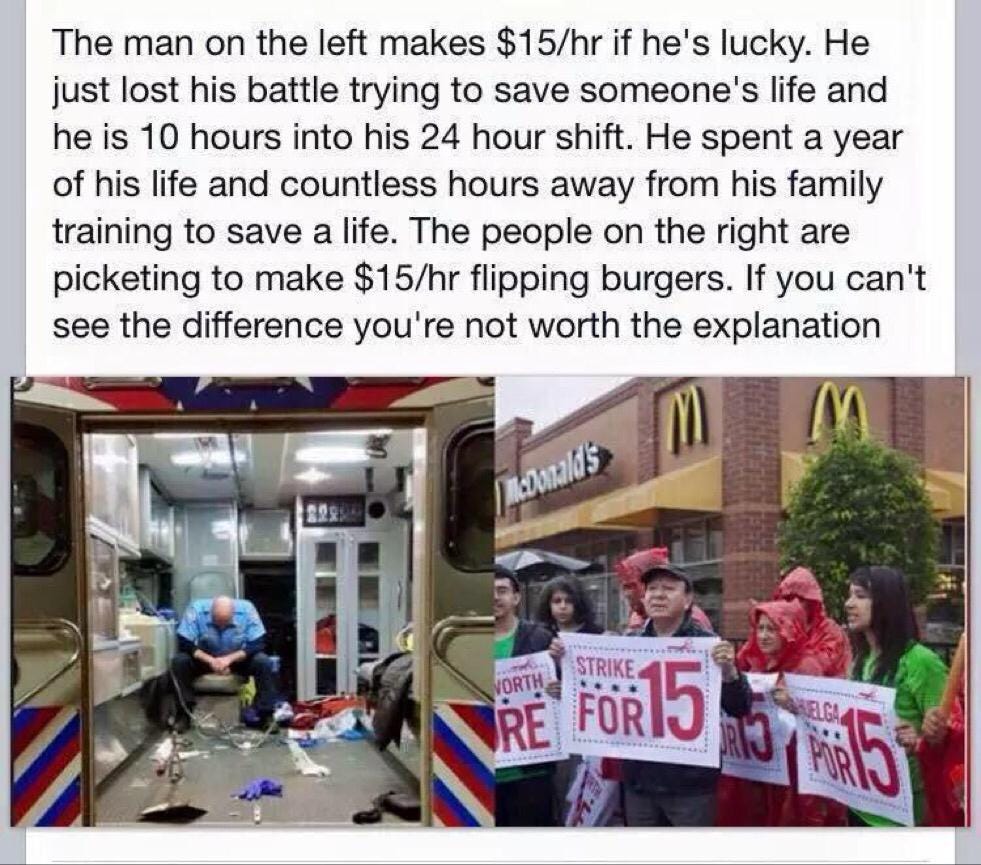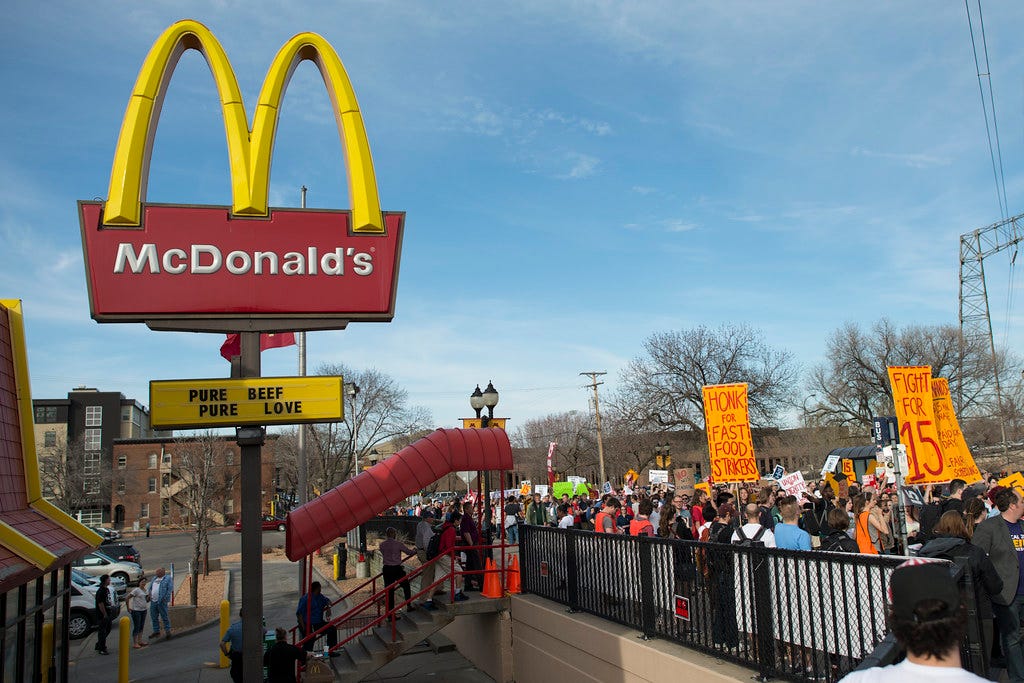Memes and the Minimum Wage
One of those memes which seems to make a slam-dunk point is actually a grotesque false dichotomy and a symbol of how we distort logic in order to perpetuate suffering.
Editorial Disclaimer: The views and opinions expressed on this web site are solely those of the original authors. These views and opinions do not necessarily represent those of National Road Magazine, the NRM staff, nor any members of the team at Distinct.
According the Economic Policy Institute, if today's minimum wage had kept pace with inflation--specifically from 1968 forward--then the nation's lowest-paid workers would be pulling in $11.62 per hour (Michaels). Salvatore Babones, writing for Inequality.org, takes umbrage with this number, however. As he argues, "Using 1968 as our benchmark for the minimum wage implies that low-wage Americans today should be making just as much as low-wage Americans were making 44 years ago. That benchmark is — frankly — ridiculous" (Babones). Instead, Babones suggests that we should model the minimum wage according the actual amount of real money flowing in the current economy, or--as he calls it-- the "overall income growth in the American economy." The net result of that calculation is staggeringly different: a hourly wage sitting just over $21 per hour. I thought of this often-overlooked part of our national minimum wage debate as I viewed the meme below. On its face, the meme--like all memes--appears to be a slam-dunk. But also like all memes, it's a deceptive bit of shell-gaming and propaganda that distorts one message and leaves out an argument that is much more important.
A Long-Raging Debate
Like a host of similar memes, this image draws its relevance from the country's long-running debate over whether every American worker who puts in 40 honest hours on the clock has earned the right to a basic standard of living. The argument, as supporters of the wage increase claim, is that everyone who shows up on time, does their work, and contributes to society is entitled to at least a safe home, three meals a day, and a basic opportunity to get further in life. They support this argument by citing that many people living on the current minimum wage must file for government support and face terrible burdens in the event of illness in many cases along with expensive mechanical breakdowns.
Opponents counter with two points. One, they argue, is that many minimum wage jobs are, by design, not meant to employ primary income earners. The wage is meant for teenagers and secondary earners who are trying to gain supplemental dollars, valuable work and life experience, or both. Further, they point out that most wage providers are small businesses, operations which cannot afford to absorb the impact of raising the minimum wage over 100% of its current value. Such an increase, they argue, will be passed on to their customers, either in the form of increased prices or curtailed services. Either way, the debate itself continues to work itself closer to the front of the national stage. And given that the last federal increase dates back to 2009, the odds that the discussion will escalate seem almost certain.
Like a host of similar memes, this image draws its relevance from the country's long-running debate over whether every American worker who puts in 40 honest hours on the clock has earned the right to a basic standard of living.
Donovan Wheeler Tweet
Fallacies Everywhere
On its face, the meme is suggesting that hourly workers at places such as McDonalds should just keep quiet and be thankful for what they have. By comparing their outrage--as captured in the meme's image of angry fast food worker holding protest signs--to the noble sacrifice of the solitary EMT worker--depicted inside an ambulance holding his head in despair--the meme is saying that: "If the EMT is willing do something more noble than 'burger-flipping' and go about his work with quiet dignity, then why can't fast-food workers do the same?"
It's a terribly flawed argument for more than one reason.
Firstly, the ad-hominem attack against hourly food-service workers as "burger-flippers" carries a range of biased assumptions: that they are lowly, unskilled workers not worthy of the basic right to demand a bigger piece of McDonalds' pie. The insult ignores the fact that most of these employees routinely went to work during the darkest days of the pandemic, and that they exposed themselves for poverty wages, while Americans making comfortable salaries safely waited for their food in the security of the drive-thru line.
Secondly, the meme creates a false dichotomy. By comparing the EMT worker to food-service workers, the meme is suggesting that the issue on the table is not the depressed wages across the board, rather it's saying that the issue is the food-workers' collective ingratitude. That the middle class is disappearing is not an issue. The sense of entitlement and the very arrogance of hourly workers, however...? That's the issue the meme turns us to.
What About the EMT?
Perhaps the best way to underscore the problem with the false dichotomy in the above meme is to replace that dichotomy with a different one. Namely this: What if the meme compared the forlorn EMT to a cardiac surgeon, or a neurologist, or an accident attorney? If we change the framing of the message, then the very message itself changes as a result. Instead of poo-pooing a horde of food-service workers for their indulgent sense of entitlement, we are now asking a much more fundamental question: Why in the world are we paying EMT's--people who literally hold others' lives in their hands--such paltry wages?
As a high school teacher, I consider my work important. I won't lie and say that I don't swell with pride when a student goes off to college, and then reaches out to me to tell me that they felt ready for the writing they faced at the university level. But on my best day, when I am doing my most important work, my value pales compared to the EMT. If the day comes (and let's all pray it never does) when we need that Emergency Medical Technician, that individual will be the most important person in our lives. I am perfectly comfortable embracing a massive wage increase for the nation's EMT workers. They should be making at least twice what I am making, if not thrice.
Clearly, the meme's decision to side-step that issue underscores the real message in the image. By dividing one underpaid group of a American workers against another, the collective attention is therefore diverted from arguably the rightful target of that rage: the powers that be who suppress wages across the board. The meme's real message is, therefore, a pro-corporate, pro-big business message. McDonald's wins. Their employees do not, the legion of EMT workers do not, and the crash victim on the side of the highway lies in greater risk than she would in a different world.
By dividing one underpaid group of a American workers against another, the collective attention is therefore diverted from arguably the rightful target of that rage
Donovan Wheeler Tweet
The Real Argument in the Meme
In his popular podcast series, American History Tellers, host Lindsey Graham (not that Lindsey Graham) said, upon the conclusion of his series covering the Gilded Age, that the strife between labor and management has been the central narrative of our history for the last two centuries. Even as far back as the 1880's, when robber barons held levels of wealth comparable to those held by the current top 1%, the mass of human labor who actually built this country felt angry. And like many angry laborers today, they split into two factions: one turning their rage to the wealthy elite, the other turning that ire to fellow laborers whom they deemed "beneath" them. This inability to get everyone on the same page, turning their outrage to the same target, has been the secret to this nation's perpetuation of the feudal oligarchy who wants to keep running it. Rather than bond together and use their collective power to make the world better, the American middle class is turning on each other. If the meme above did one thing well, it was in capturing that toxic sentiment.
Image Credit: "Fast food strike and protest for a $15/hour minimum wage at a McDonalds restaurant" by Fibonacci Blue is licensed under CC BY 2.0
Featured Image Credit: "Dollar" by Images_of_Money is licensed under CC BY 2.0





